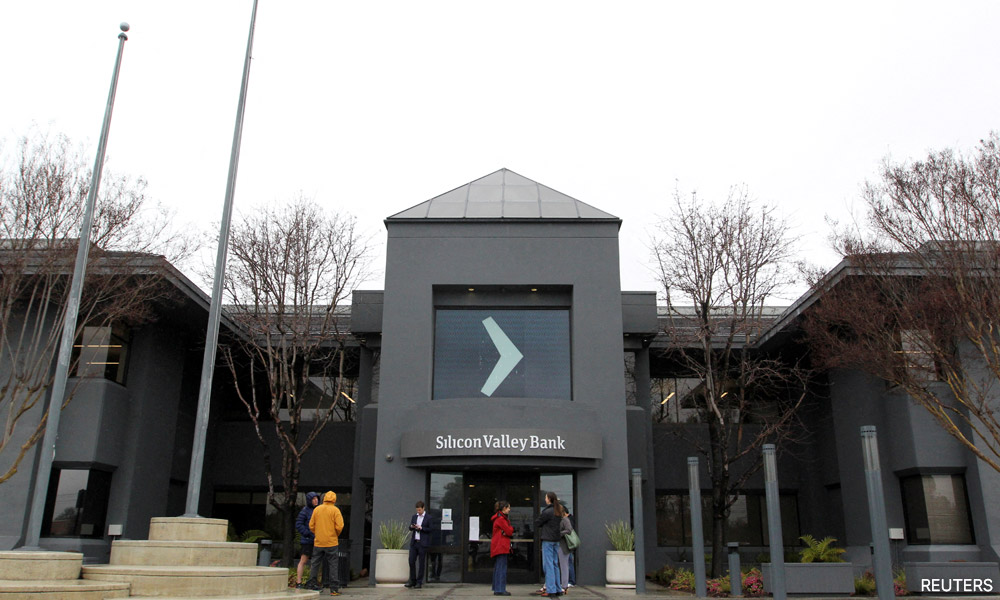Bank stocks around the world plunged on Monday even as President Joe Biden vowed to take action to ensure the safety of the US banking system after the sudden collapse of Silicon Valley Bank and Signature Bank.
Biden's efforts to reassure markets and depositors came after emergency US measures to shore up banks by giving them access to additional funding failed to dispel investor worries about potential contagion to other lenders worldwide.
The White House said the Treasury Department is working with regulators on the next steps.
With investors fearing additional failures, major US banks lost around US$90 billion in stock market value on Monday, bringing their loss over the past three trading sessions to nearly US$190 billion.
Regional banks were hit the hardest. Shares of First Republic Bank tumbled more than 60 percent as news of fresh financing failed to reassure investors, and so did Western Alliance Bancorp and PacWest Bancorp.
Europe first felt the shock waves. The STOXX banking index closed 5.7 percent lower. Germany's Commerzbank fell 12.7 percent, while Credit Suisse slid 9.6 percent to a new record low.
Biden said his administration's actions meant "Americans can have confidence that the banking system is safe," while also promising stiffer regulation after the biggest US bank failure since the 2008 financial crisis.
"Your deposits will be there when you need them," he said.
SVB's meltdown sparked a partisan battle in Washington on Monday, with Democrats arguing that a Trump-era change to bank oversight rules undermined the stability of regional banks.
"Let's be clear. The failure of Silicon Valley Bank is a direct result of an absurd 2018 bank deregulation bill signed by (Republican former president) Donald Trump that I strongly opposed," US Senator Bernie Sanders said in a statement.
Republicans rejected the idea that the changes made during Trump's four years in the White House were to blame.
Crisis averted?
In the money markets, indicators of credit risk in the US and eurozone banking systems edged up.
"When a step (is taken) this big, this quickly, your first thought is 'crisis averted.' But your second thought is, how big was that crisis, how big were the risks that this step had to be taken?" said Rick Meckler, partner at Cherry Lane Investments.

Emboldened by bets that the US Federal Reserve may have to slow its rate hikes, and with investors seeking safe havens, the price of gold raced above the key US$1,900 level.
"There is a sense of contagion and where we see a repricing around financials is leading to a repricing across markets," said Mark Dowding, chief investment officer at BlueBay Asset Management in London.
SVB's customers will have access to all their deposits from Monday and regulators set up a new facility to give banks access to emergency funds, and the Fed made it easier for banks to borrow from it in emergencies.
On Monday morning, US bank regulators sought to reassure nervous customers who lined up outside SVB's Santa Clara, California, headquarters, offering coffee and doughnuts.
"Feel free to transact business as usual. We just ask for a little bit of time because of the volume," FDIC employee Luis Mayorga told the waiting customers.
The first customer, who did not want to be named, said they arrived at SVB at 4am.
Regulators also moved swiftly to close New York's Signature Bank, which had come under pressure in recent days.
"A serious investigation needs to be undertaken on why the regulators missed red flags ... and what needs to be overhauled," said Mark Sobel, a former senior Treasury official and US chair of think tank OMFIF.
Fallout
Companies around the globe with SVB accounts rushed to assess the impact on their finances. In Germany, the central bank convened its crisis team to assess any fallout.
After marathon weekend talks, HSBC said it was buying the British arm of SVB for one pound (US$1.21).
While SVB UK is small, its sudden demise prompted calls for government help for Britain's startup industry and its heavily exposed biotech sector in particular.
Prime Minister Rishi Sunak added his voice to those in the UK saying there was no concern about systemic risk.
"Our banks are well capitalised, the liquidity is strong," Sunak told ITV during a visit to the United States.
A furious race to reprice interest rate expectations also sent waves through markets as investors bet the Fed will be reluctant to hike next week.
The Fed's options are limited, said Sobel. "The Fed could cut rates, but that has its own drawbacks. So the Fed and Treasury have kind of shot their bazooka for now. I think it's a question of the market steadying out. Is this a one-off adjustment in regional banks, or does it portend more to come?"
Traders currently see a 50 percent chance of no rate hike at that meeting, with rate cuts priced in for the second half of the year. Early last week a 25 basis-point hike was fully priced in, with a 70 percent chance seen of 50 basis points.
- Reuters

